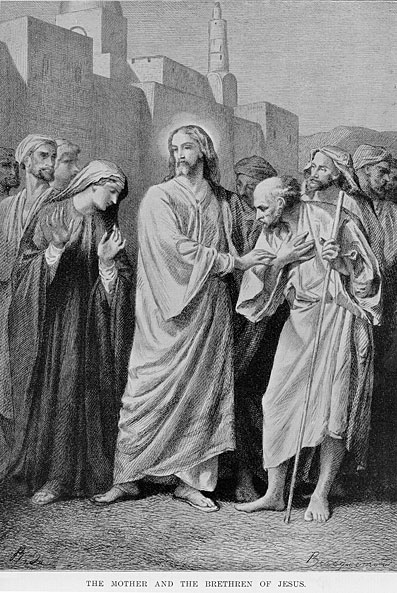Jesus’ In-Crowd
or The First Shall Be Last
Yesterday’s post concerning Jesus’ message to John had some discussion about lepers becoming New Covenant priests. Those who were condemned to live outside were made clean and invited in. Of course, there is Jesus’ own condemnation of those who watched harlots and tax collectors enter the kingdom but defiantly stood outside themselves.
Right up until the end of the Jewish war, the Jewish leadership got their clean and unclean, their inside and outside, more and more wrong. The gospel turned their world upside down–or, in fact, rightside up.
John Barach observes how Mark applies this to Jesus’ own family using literary structure:
Who’s Standing Outside?
Mark 3:20-35 is one of Mark’s typical sandwiches, in which a story starts, gets interrupted by a second story which relates to it in some way, and then finally comes to its conclusion. Here, we are told that, having heard about Jesus’ behavior, some of “His own people” come to seize him, saying, “He is out of his mind” (3:20-21). Then we have the second story, Jesus’ confrontation with the scribes from Jerusalem who claim that he casts out demons by the ruler of the demons (3:22-30). Finally, we return to the first story, when Jesus’ brothers and mother come and send for Jesus and when Jesus identifies those who are doing God’s will by sitting around him as his brother and sister and mother (3:31-35).
That structure is obvious even in an English translation. But a look at the Greek reveals an interesting play on words. At the beginning, when Jesus’ “own people” say that he is “out of his mind” (3:21), the word used literally (or, rather, etymologically) means “standing outside.” (Perhaps that’s roughly equivalent to our English expression “beside himself.”) But at the end of the story, Jesus’ brothers and mother come, and “standing outside” they call him (3:31; cf. 3:32, which stresses that they are “outside”).
So Jesus’ “own people” think Jesus is the one “standing outside” (= crazy). But Jesus’ family members turn out to be the ones literally “standing outside,” while Jesus identifies those who are *sitting inside* as his true family, those who, in obedience to God’s will, are “sitting around him” (3:32, 34). To be his true family — his true mother and brothers — his natural mother and brothers ought to come inside instead of calling him out.
But in a sandwich story, the middle story also relates to the story that frames it. And so here it is not just the frame story that involves standing (and sitting). In 3:24-25, Jesus says that a divided kingdom or a divided household cannot “stand.” And in 3:26, he speaks of “the satan” as “standing up” against himself.
The reference to the divided household that doesn’t “stand” might resonate with the frame story: Jesus’ natural household won’t stand if his mother and brothers are divided against Jesus. If they continue to “stand outside” instead of “sitting around him,” then their household won’t stay standing. That makes sense to me.
What about the reference to Satan’s “standing up” (a term for both resurrection and insurrection) against himself (3:26)? I’m not sure how—or if—it relates, though it does provide one more verbal echo in this passage. For that matter, Mark’s Gospel is full of references to “standing”: in every healing, people “stand up,” until at the end the same terms are used for Jesus’ resurrection.
But the repetition of the word “stand” and especially of words having to do with “standing outside” sets up a whole set of questions: Who is really “standing outside”? If Jesus’ family thinks Jesus is “standing outside” in the sense of being insane, then their household won’t “stand.” And if you think Jesus is “standing outside” in that sense, then you end up “standing outside” yourself, here literally but, as Jesus’ words make clear, also in a deeper sense. The family is sitting inside, sitting around Jesus and with Jesus. That’s God’s will, Jesus says. You’d have to be insane to be “standing outside.”
“Try your own selves, whether ye are in the faith; prove your own selves.
Or know ye not as to your own selves, that Jesus Christ is in you?
unless indeed ye be reprobate.” 2 Corinthians 13:5 [ASV]


























